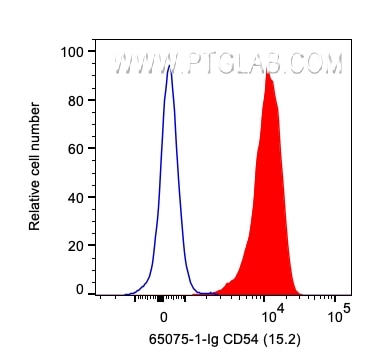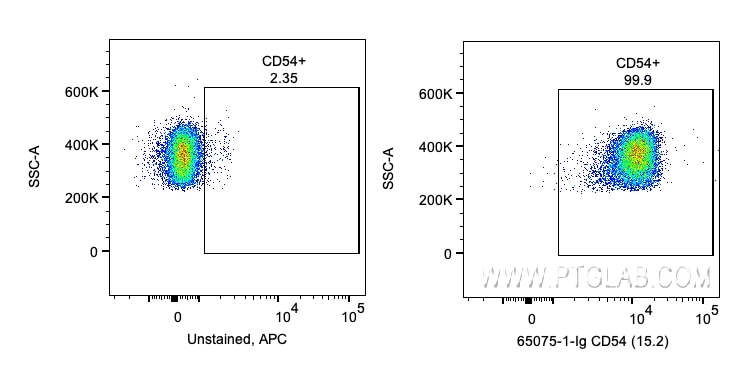Anticorps Monoclonal anti-CD54 (ICAM-1)
CD54 (ICAM-1) Monoclonal Antibody for FC
Hôte / Isotype
Mouse / IgG1, kappa
Réactivité testée
Humain
Applications
FC
Conjugaison
Non conjugué
CloneNo.
15.2
N° de cat : 65075-1-Ig
Synonymes
Galerie de données de validation
Applications testées
| Résultats positifs en cytométrie | CMSP humaines, |
Dilution recommandée
| Application | Dilution |
|---|---|
| This reagent has been tested for flow cytometric analysis. It is recommended that this reagent should be titrated in each testing system to obtain optimal results. | |
| Sample-dependent, check data in validation data gallery | |
Informations sur le produit
65075-1-Ig cible CD54 (ICAM-1) dans les applications de FC et montre une réactivité avec des échantillons Humain
| Réactivité | Humain |
| Hôte / Isotype | Mouse / IgG1, kappa |
| Clonalité | Monoclonal |
| Type | Anticorps |
| Immunogène | Cellules synoviales rhumatoïdes et monocytes humains |
| Nom complet | intercellular adhesion molecule 1 |
| Masse moléculaire calculée | 90 kDa |
| Numéro d’acquisition GenBank | BC015969 |
| Symbole du gène | ICAM1 |
| Identification du gène (NCBI) | 3383 |
| Conjugaison | Non conjugué |
| Forme | Liquide |
| Méthode de purification | Purification par affinité |
| Tampon de stockage | PBS with 0.09% sodium azide. |
| Conditions de stockage | Store at 2-8°C. Stable for one year after shipment. |
Informations générales
ICAM-1 (CD54) is a 90-kDa transmembrane glycoprotein of the immunoglobulin superfamily and is critical for the firm attachment and transmigration of leukocytes out of blood vessels and into tissues (PMID: 19307690). ICAM-1 is expressed by several cell types, typically on endothelial cells and cells of the immune system, and its expression can be up-regulated by various stimuli, including TNF-α, INF-γ, IL-1 and thrombin (PMID: 3086451; 9694714; 15979056). It is a ligand for LFA-1 and Mac-1, serves as a receptor for rhinovirus, and is one of several receptors used by Plasmodium falciparum (PMID: 2566624; 2538244; 2475784).
Protocole
| Product Specific Protocols | |
|---|---|
| FC protocol for CD54 (ICAM-1) antibody 65075-1-Ig | Download protocol |
| Standard Protocols | |
|---|---|
| Click here to view our Standard Protocols |



